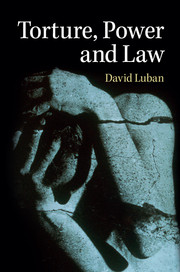Book contents
- Frontmatter
- Dedication
- Contents
- Preface
- Acknowledgments
- I Downgrading rights and expanding power during post-9/11 panic
- II The ticking bomb as moral fantasy and moral fraud
- III The evils of torture
- 5 A communicative conception of torture
- 6 Human dignity, humiliation, and torture
- 7 Mental torture: a critique of erasures in US law
- IV Complicity in torture
- Main index
- Index of legal authorities
- References
5 - A communicative conception of torture
Published online by Cambridge University Press: 05 September 2014
- Frontmatter
- Dedication
- Contents
- Preface
- Acknowledgments
- I Downgrading rights and expanding power during post-9/11 panic
- II The ticking bomb as moral fantasy and moral fraud
- III The evils of torture
- 5 A communicative conception of torture
- 6 Human dignity, humiliation, and torture
- 7 Mental torture: a critique of erasures in US law
- IV Complicity in torture
- Main index
- Index of legal authorities
- References
Summary
One of the most basic questions a book on torture must answer is what exactly torture is.
One could dispute this claim. Why does a word we understand all too well need to be defined? When the US Department of Justice’s secret torture memos were released in 2009, the journalist Kathleen Parker wrote this:
Several years ago, I asked a veteran journalist for advice.
“I’m trying to figure out if I have an ethical conflict,” I began.
“If you have to ask, you do,” he said…
Apply the same construct to torture. If we have to ask, it probably is.
Pursuing the same line of thought, Jeremy Waldron observes that the prohibition on torture is not like a tax regulation, which needs precision because we expect even blameless taxpayers to push to the limits of the law. It is more like the prohibitions on domestic violence and sexual harassment, where you have no business demanding precise guidance on exactly how far you can go.
- Type
- Chapter
- Information
- Torture, Power, and Law , pp. 111 - 136Publisher: Cambridge University PressPrint publication year: 2014
References
- 1
- Cited by



